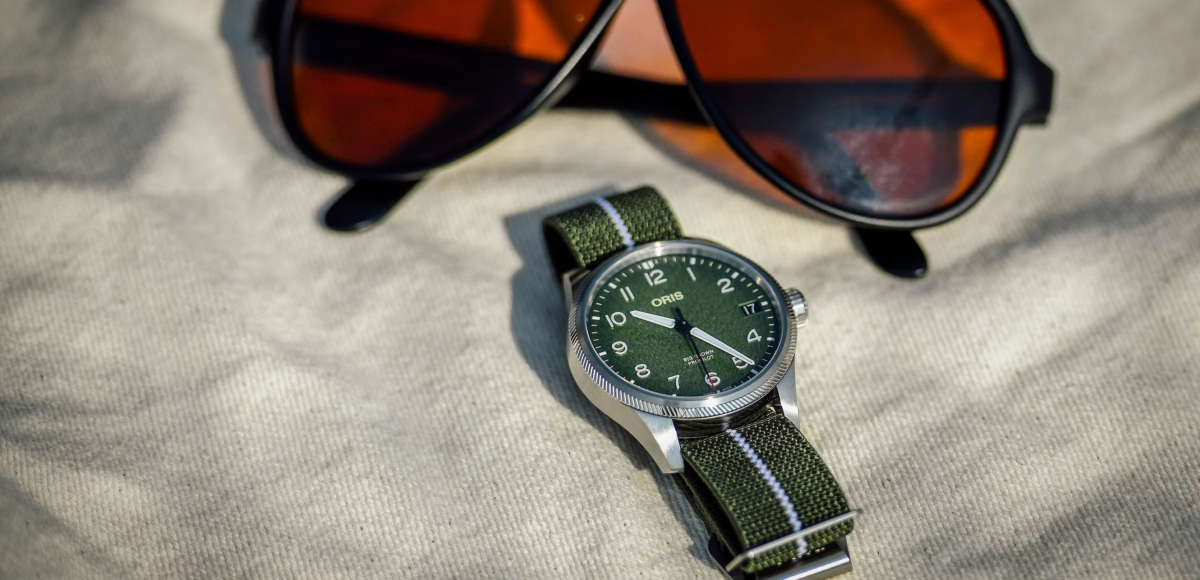Hands-On: Go Green With This Limited Edition Oris
… and help the local communities of Africa’s Okavango Delta, too.
In the middle of the Kalahari desert lies a verdant green oasis that spans 5,791 square miles when it’s flooded. It’s the largest inland delta in the world, and it’s home to the big five game animals: Rhinos, elephants, lions, buffalo, and leopards, not to mention over 400 species of birds. It’s unlike anywhere else on the planet, and that’s why it was named a UNESCO World Heritage site. It’s been referred to as the “Kalahari’s Emerald.”
This is the Okavango Delta.
From June through August, the delta experiences peak flooding and draws wildlife in from hundreds of miles, producing a massive concentration of flora and fauna. Tourists from all over the globe come to see the delta, and the five local ethnic groups have come to live off the bounty provided by the delta.
Thousands of grassy islands make up the delta; marshes and lagoons make most of the delta’s communities impossible to reach by land. Prior to 2011, anyone needing emergency medical attention or an emergency airlift would have to wait for aircraft from neighboring South Africa. Botswana simply didn’t have the assets required to provide that service for local communities or tourists.
That’s why in 2011, Christian Gross of Switzerland and Dr. Misha S. Kruck set up an organization to provide aeromedical resources to the Okavango Delta. Ten years later the Okavango Air Rescue, or O.A.R., operates two Pilatus PC-12 airframes along with a pair of Bell Jetranger 206 III helicopters. It started as an organization with a sharp focus on airborne evacuations, but now it’s grown to serve as a provider of general medicine through operating a polyclinic alongside its aeromedical operations. Doctors, pilots, nurses, paramedics, and administration staff make up the organization, most of them from Botswana. To date, nearly 20,000 patients have been served at the polyclinic and roughly 1,500 people seeking medical attention have flown with O.A.R.’s aeromedical services. If the patient doesn’t have insurance that will cover the costs of the assistance, O.A.R. waives the cost.
And Oris has made a watch to celebrate a decade of the O.A.R.’s commitment to bringing medical resources to the Okavango Delta.
This limited Big Crown ProPilot, called the Okavango Air Rescue Limited Edition features a dial that mirrors the deep green hues of the delta. There’s a slight gradient in the shade of the dial, too, akin to a fumé pattern. In 2021, watches with green dials are nothing new – everyone’s getting in on the action – but I’ve never seen a dial fashioned after one of Africa’s Seven Natural Wonders before. Like many watches from Oris, its strength comes from a unique blend of originality and altruism.
The dial was created specifically for this watch. When I first saw it I immediately understood the connection, it isn’t so abstract that it leaves you scratching your head. Looking at the dial must be a lot like looking down at the Okavango Delta from a pilot’s point of view.
The caseback features an engraving of O.A.R.’s Pilatus PC-12 soaring above the delta. There will be 2,011 examples of this watch produced, and a portion of the proceeds will go towards O.A.R.’s operating costs. It helps them continue offering priceless, life-saving aid to the Delta’s isolated communities.
Two straps are supplied with the watch, a custom strap by Erika’s Originals, and a leather NATO. The Erika’s strap is supremely comfortable and is exactly the kind of strap I’d wear the watch on for a stint as an O.A.R. pilot. It’s rugged, fits almost everyone (it’s got plenty of elasticity), and the clasp mechanism is secure. The Big Crown ProPilot is full of design features that make sense for its application, like a machined crown that’s easy to turn, and a chunky case with a handsome fluted pattern milled into the bezel that’s unique to the Pro Pilot series. Oris’s unique fluted bezel is great in titanium, like the application on the Pro Pilot X, but it’s just as at-home on the 41mm stainless steel case. The large, arabic numerals bursting with dimensionality stand out from the dial, and legibility is a key strength of the Big Crown ProPilot line. With a dial that’s heavily textured and bright, the simplicity of the numerals balances it out nicely. The hands are painted white and filled with lume, creating the right amount of contrast against the bright green dial.
The Okavango limited edition is a simple watch, showing the time and date, powered by the Oris caliber 751 (Sellita 220-1). Oris does have the in-house caliber 400 in their arsenal, but when it comes to this watch, I appreciate the inclusion of the caliber 751 because it means keeping the cost down and making the watch more accessible to a wider audience, a lot like the O.A.R. mission to offer aeromedical services to the most amount of people possible. It rings in at $2,500, and it’s limited to 2011 pieces, a nod to the founding year of O.A.R.
I’ve never been to the Okavango Delta, and that’s why what Oris routinely does is so interesting. Oris puts the spotlight on subjects that no one else in this industry does (Oris also introduced me to the Wadden Sea). They’re also partnered with two other aeromedical organizations – Rega and the Royal Flying Doctor Service of Australia. And it’s not all conceptual, there’s a practical element here that drives the bottom line of these organizations and helps them continue the important work they’re doing. This O.A.R. watch is an interesting example of how horology can help bring something necessary, like aeromedical services, to an underserved community while still producing an attractive and novel watch you’d want on your wrist.
Get More Articles Like This in Your Inbox
We're constantly creating great content like this. So, why not get it delivered directly to your inbox? By subscribing you agree to our Privacy Policy but you can unsubscribe at any time.













